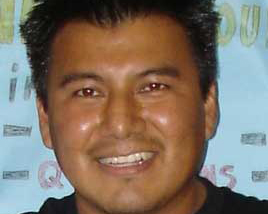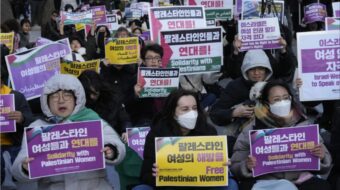
WASHINGTON (PAI)— Amid indications the Mexican government “would like to sweep the whole thing under the rug,” as his union president says, a special Inter-American panel on Nov. 4 tackled the unsolved 2007 murder of U.S. union organizer Santiago Rafael Cruz in Monterrey, Mexico.
Cruz was tortured and murdered on April 9, 2007, in the Monterrey office of the Farm Labor Organizing Committee, an AFL-CIO union. Cruz died while battling the human trafficking which annually sneaks thousands of undocumented workers across the Mexican border into the U.S., FLOC President Baldemar Velasquez said.
Cruz and FLOC fought the use of such contract labor by providing a legal alternative for workers who seek visas to toil in the U.S. His actions, and FLOC’s role, angered the cartels who smuggle the workers across the border, Velasquez said in an exclusive interview after the hour-plus hearing before the Inter-American Commission On Human Rights, an arm of the Organization of American States.
After an initial investigation, the Inter-American panel forced the Mexican government and the Nuevo Leon state government to erect security precautions around FLOC’s Monterrey office. Mexico wants those protections removed.
But Mexico’s sorry record in tracking down the four suspects in Cruz’s killing — even though FLOC provided them with names and addresses for at least two of them — calls into question whether those precautions should be removed, Velasquez says.
One of the four suspects, Eduardo Rodriguez Cervantes, “was picked up by the U.S. Border Patrol while trying to sneak into the U.S.,” Velasquez explained. “He was turned over to the Sonorant state government” and its law enforcement authorities “who released him even before the officials from Nuevo Leon could come to pick him up.”
Another of the suspects, Jaime Martinez Amador, is also wanted in the U.S. on charges of human trafficking and armed robbery, Velasquez added.
Mexican officials appear, despite their protestations to the Inter-American panel, to have little interest in solving the crime. “The Mexican government representative said ‘We’ll follow up and complete this case.’ Rotsa ruck,” Velasquez said sardonically. Mexican officials also spoke at the D.C. hearing, but left quickly afterwards.
Despite that evidence, the 7-member panel, which probes human rights violations all over Latin America, was skeptical that FLOC’s office needs further protection. It said there have been no incidents at the office since Cruz’s murder.
That led Velasquez to point out to the panel that FLOC staffers, in the ensuing two years, have been “shadowed and tracked” when they tried to help other Mexican-based workers seeking U.S. work visas, particularly at the U.S. consulate in Nuevo Laredo, just across the Rio Grande River from Texas.
“I had to tell the panel there’s a low level of confidence” in the Mexican police departments whom FLOC would have to go to in the intimidation cases, he added. Velasquez promised to provide evidence of the surveillance and intimidation. The panel gave no indication when it would decide FLOC’s case — or of what, if anything, it would order Mexico to do.
“As long as FLOC is creating an alternative system of clean recruitment, where the workers aren’t getting cheated, then we’re a threat to these criminal enterprises,” Velasquez pointed out.
FLOC drew movement-wide support at the panel hearing, with representatives from the AFL-CIO, the Teamsters and the Service Employees present.
“The whole process of precautionary measures” at FLOC’s office after Cruz’s murder “forced the Mexican governments and its state governments to maintain pressure” to solve the case, said Stanley Gacek, AFL-CIO Associate Director for International Development.
“For our Latino members, Santiago Rafael Cruz is a martyr,” added Timothy Beaty, IBT’s Director of Global Strategies. The Teamsters also saw a murdered organizer, in El Salvador.
But Velasquez said there’s another side to the Cruz case that the international panel cannot tackle: The fact that U.S.-based corporations know of the trafficking Cruz and FLOC are fighting — and exploit it.
He pointed out that an estimated 20,000 workers Cruz was helping were being recruited by Mexican-based “coyotes” to cut tobacco in U.S. fields for RJR Nabisco. Exploitation also occurs, with company connivance, in the building trades, he adds. “This is the labor supply coming across the southern U.S. — and they know it,” he said.
Photo: Santiago Rafael Cruz via FLOC.

MOST POPULAR TODAY


Zionist organizations leading campaign to stop ceasefire resolutions in D.C. area

High Court essentially bans demonstrations, freedom of assembly in Deep South

Communist Karol Cariola elected president of Chile’s legislature

Afghanistan’s socialist years: The promising future killed off by U.S. imperialism





Comments